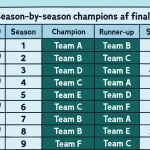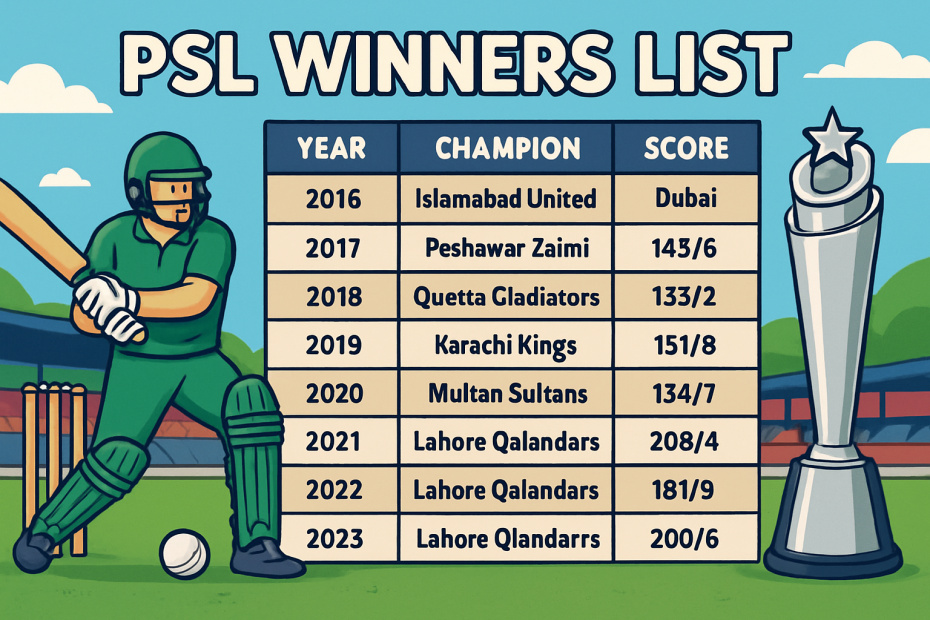A trophy tells the truth about a league’s soul. For the Pakistan Super League, that truth is a blend of audacious pace, tactical calm, and a particular strain of nerve that only arrives when a nation stops to watch the last over. Over its nine editions, the Pakistan Super League has delivered a champion each time that felt both inevitable and hard-won, a crescendo driven by death-overs drama and a carousel of coaching ideas imported and sharpened locally. This is the definitive PSL winners list—season-wise and team-wise—with scores, venues, margins, and the honors that tell the fuller story behind those medals and fireworks.
Quick answer summary
- Current champion: Islamabad United, crowned after a last-ball finish in Karachi, prevailing over Multan Sultans by 2 wickets.
- Most titles: Islamabad United with 3 trophies.
- Back-to-back champions: Lahore Qalandars, the only side to defend the title.
PSL winners list year wise (season-wise)
A season-by-season capsule of champions, runners-up, final margins and venues, plus the awards that often hint at why a team went the distance.
Season One
- Winner: Islamabad United
- Runner-up: Quetta Gladiators
- Final margin: 6 wickets
- Final scores: Quetta 174/7; Islamabad 175/4 (18.4 ov)
- Venue: Dubai International Cricket Stadium
- Winner’s captain: Misbah-ul-Haq
- Final player of the match: Dwayne Smith
- Player of the tournament: Ravi Bopara
- Leading run-scorer: Umar Akmal (335)
- Leading wicket-taker: Andre Russell (16)
Context and insight: Islamabad built victory on tournament-best adaptability. Misbah’s measured leadership and Dean Jones’ fearless matchups unlocked a flexible XI where power-hitters were rotated to maximize favorable match-ups. In the final, Dwayne Smith’s strong-armed striking neutralized Quetta’s spin choke and set the tone in the chase long before Andre Russell and Brad Haddin pressed home the advantage. Early PSL surfaces demanded strong back-of-length bowling; Russell’s sharp hits-the-deck angle made him both wicket-taker and intimidator, and it paid with the ball and with field-setting leverage.
Season Two
- Winner: Peshawar Zalmi
- Runner-up: Quetta Gladiators
- Final margin: 58 runs
- Final scores: Peshawar 148/6; Quetta 90 all out
- Venue: Gaddafi Stadium, Lahore
- Winner’s captain: Darren Sammy
- Final player of the match: Darren Sammy
- Player of the tournament: Kamran Akmal
- Leading run-scorer: Kamran Akmal
- Leading wicket-taker: Sohail Khan (16)
Context and insight: A final played in Lahore was bigger than sport; the night carried the weight of a league returning home. Darren Sammy’s streetwise game sense—using Wahab Riaz’s round-the-wicket angle to flood the body-line and forcing hitters into miscues—added muscle to a batting unit driven by Kamran Akmal’s aggressive starts. Peshawar’s blueprint was old-school T20: seize the powerplay, then strangle with hit-the-deck and wide-yorker lanes. Sammy’s calm, and yes, his own runs under pressure, ensured the contest never got close.
Season Three
- Winner: Islamabad United
- Runner-up: Peshawar Zalmi
- Final margin: 3 wickets
- Final scores: Peshawar 148/9; Islamabad 154/7
- Venue: National Stadium, Karachi
- Winner’s captain: Misbah-ul-Haq
- Final player of the match: Luke Ronchi
- Player of the tournament: Luke Ronchi
- Leading run-scorer: Kamran Akmal
- Leading wicket-taker: Faheem Ashraf (18)
Context and insight: Islamabad returned with that same shape-shifting courage but powered by new speed at the top. Luke Ronchi did to powerplays what very few dare in Pakistan—he hit length bowling on the up through the covers and dragged anything short over midwicket from the hip. Faheem Ashraf’s tournament-leading wickets didn’t arrive through raw pace; they came through the PSL’s signature weapon: deceptive length and skiddy cross-seam cutters. Islamabad’s secret remained balance. In this league, the team that finds the extra overs from semi-bowlers without bleeding often survives chaos. Islamabad built that balance better than anyone.
Season Four
- Winner: Quetta Gladiators
- Runner-up: Peshawar Zalmi
- Final margin: 8 wickets
- Final scores: Peshawar 138/8; Quetta 139/2
- Venue: National Stadium, Karachi
- Winner’s captain: Sarfaraz Ahmed
- Final player of the match: Mohammad Hasnain
- Player of the tournament: Shane Watson
- Leading run-scorer: Shane Watson
- Leading wicket-taker: Hasan Ali (25)
Context and insight: Quetta had twice touched the trophy glass and walked away empty-handed; this time Sarfaraz Ahmed’s relentless intensity let no nerve slip. The win was built on quick bowling that hit uncomfortable lengths and a chase anchored by clinical boundary options. Mohammad Hasnain’s pace set the tone, softening top orders with heavy balls that climbed off good length even on flatter Karachi evenings. Watson, who dominated the season with a distinctive PSL pattern—stand tall, clear front leg, muscle straight or midwicket—didn’t need to star in the final. Quetta bowled smarter lines and removed the drama.
Season Five
- Winner: Karachi Kings
- Runner-up: Lahore Qalandars
- Final margin: 5 wickets
- Final scores: Lahore 134/7; Karachi 135/5
- Venue: National Stadium, Karachi
- Winner’s captain: Imad Wasim
- Final player of the match: Babar Azam
- Player of the tournament: Babar Azam
- Leading run-scorer: Babar Azam
- Leading wicket-taker: Shaheen Shah Afridi (17)
Context and insight: Karachi’s triumph felt like a city finally exhaling. In a season interrupted and then completed under unique constraints, Babar Azam’s classical control outran every stylistic trend. He did the most difficult thing in this league: chase without panic. Imad Wasim’s use of the ball in the powerplay—into the pitch to deny batters the first-swing boundary and then darts at the stumps—often flipped early momentum. When Lahore met Karachi, it felt like a derby arranged in a stadium, but Babar’s ice trimmed all romance down to a methodical chase.
Season Six
- Winner: Multan Sultans
- Runner-up: Peshawar Zalmi
- Final margin: 47 runs
- Final scores: Multan 206/4; Peshawar 159/9
- Venue: Sheikh Zayed Stadium, Abu Dhabi
- Winner’s captain: Mohammad Rizwan
- Final player of the match: Sohaib Maqsood
- Player of the tournament: Sohaib Maqsood
- Leading run-scorer: Babar Azam
- Leading wicket-taker: Shahnawaz Dahani (20)
Context and insight: Multan’s rise was textbook T20 evolution: a captain re-centering his vision around repeatable roles, a domestic spearhead pacing the middle overs, and power anchored by Rilee Rossouw and Sohaib Maqsood. In Abu Dhabi’s night air, slower balls hang and cutters bite; Multan built a batting template to front-run, then bowled into the pitch to exploit mis-hits. Rizwan’s captaincy is underrated for how simple it makes complex passages look; fielders where the ball wants to go, bowlers allowed to play to their strengths rather than a shape they don’t trust. Maqsood’s clean striking through the arc and Dahani’s joyous, skiddy pace embodied a champion’s pulse.
Season Seven
- Winner: Lahore Qalandars
- Runner-up: Multan Sultans
- Final margin: 42 runs
- Final scores: Lahore 180/5; Multan 138 all out
- Venue: Gaddafi Stadium, Lahore
- Winner’s captain: Shaheen Shah Afridi
- Final player of the match: Mohammad Hafeez
- Player of the tournament: Mohammad Rizwan
- Leading run-scorer: Fakhar Zaman (588)
- Leading wicket-taker: Shadab Khan (19)
Context and insight: Lahore completed a renaissance that had been building for seasons—smart recruitment, a trusted core, and a captain with aura. Shaheen set fields aggressively and refused to babysit big hitters; he attacked, particularly with ring fields for cutters even to set batters. The final turned on Mohammad Hafeez’s old-school composure with bat and ball. Fakhar Zaman’s season was an exhibition in naming the powerplay, picking the bowler early, and going through the off side hard. Shadab Khan’s wickets for Islamabad underline another PSL truth: on these pitches, leg-spin with pace on the ball is a match-bending resource.
Season Eight
- Winner: Lahore Qalandars
- Runner-up: Multan Sultans
- Final margin: 1 run
- Final scores: Lahore 200/6; Multan 199/8
- Venue: Gaddafi Stadium, Lahore
- Winner’s captain: Shaheen Shah Afridi
- Final player of the match: Shaheen Shah Afridi
- Player of the tournament: Mohammad Rizwan
- Leading run-scorer: Mohammad Rizwan
- Leading wicket-taker: Abbas Afridi (23)
Context and insight: The most gripping finish of the tournament’s history. Lahore defended two off the last ball in a final pulsing with back-and-forth momentum. Shaheen’s final was leadership as performance art—blistering lower-order hitting to push Lahore to a winning score, then the new-ball spell and death overs that bent a near-unwinnable chase back into possibility. Multan’s rise had codified a data-first approach, but in this final, instinct and nerve shaded the equation. Abbas Afridi’s slower-ball mastery was the season’s bowling story; you could see batters’ hands close too early and the ball sit up to be caught.
Season Nine
- Winner: Islamabad United
- Runner-up: Multan Sultans
- Final margin: 2 wickets (last ball)
- Final scores: Multan 159/9; Islamabad 163/8
- Venue: National Bank Stadium, Karachi
- Winner’s captain: Shadab Khan
- Final player of the match: Imad Wasim
- Player of the tournament: Usman Khan
- Leading run-scorer: Babar Azam (569)
- Leading wicket-taker: Mohammad Ali (24)
Context and insight: The champions built their season around relentless close-out bowling and a batting order that refused to go cold twice on the night. Imad Wasim’s spell in the final—varying pace, length and angles like a chess player—was a masterclass in killing scoring options without conceding freebies. Shadab’s captaincy leaned on flexibility; Islamabad moved parts mid-overs to break partnerships, a hallmark of their earlier era. Multan, for all their excellence, found themselves one hit short again; that is perhaps the PSL’s spine—winning requires cruelty at the death.
Team-wise PSL titles
- Islamabad United: 3 (Seasons One, Three, Nine)
- Lahore Qalandars: 2 (Seasons Seven, Eight)
- Peshawar Zalmi: 1 (Season Two)
- Quetta Gladiators: 1 (Season Four)
- Karachi Kings: 1 (Season Five)
- Multan Sultans: 1 (Season Six)
Every franchise now holds at least one title. That parity is unusual for a T20 league and speaks to the draft’s equalizing effect and the PCB’s insistence on domestic pace stocks. The outlier is Islamabad United, who have repeatedly optimized their resource mix and decision-making in pressure moments. Multan Sultans’ run of four consecutive finals is the clearest example of project thinking done right; yet it offers a brutal reminder—the line between dynasty and heartbreak is one ball.
Compact year-wise table with scores, venues, awards
| Season | Winner vs Runner-up | Margin | Venue | Final MoM | Player of the Tournament | Top Runs | Top Wickets | Winning Captain |
|---|---|---|---|---|---|---|---|---|
| One | Islamabad United beat Quetta Gladiators | 6 wickets | Dubai | Dwayne Smith | Ravi Bopara | Umar Akmal (335) | Andre Russell (16) | Misbah-ul-Haq |
| Two | Peshawar Zalmi beat Quetta Gladiators | 58 runs | Lahore | Darren Sammy | Kamran Akmal | Kamran Akmal | Sohail Khan (16) | Darren Sammy |
| Three | Islamabad United beat Peshawar Zalmi | 3 wickets | Karachi | Luke Ronchi | Luke Ronchi | Kamran Akmal | Faheem Ashraf (18) | Misbah-ul-Haq |
| Four | Quetta Gladiators beat Peshawar Zalmi | 8 wickets | Karachi | Mohammad Hasnain | Shane Watson | Shane Watson | Hasan Ali (25) | Sarfaraz Ahmed |
| Five | Karachi Kings beat Lahore Qalandars | 5 wickets | Karachi | Babar Azam | Babar Azam | Babar Azam | Shaheen Shah Afridi (17) | Imad Wasim |
| Six | Multan Sultans beat Peshawar Zalmi | 47 runs | Abu Dhabi | Sohaib Maqsood | Sohaib Maqsood | Babar Azam | Shahnawaz Dahani (20) | Mohammad Rizwan |
| Seven | Lahore Qalandars beat Multan Sultans | 42 runs | Lahore | Mohammad Hafeez | Mohammad Rizwan | Fakhar Zaman (588) | Shadab Khan (19) | Shaheen Shah Afridi |
| Eight | Lahore Qalandars beat Multan Sultans | 1 run | Lahore | Shaheen Shah Afridi | Mohammad Rizwan | Mohammad Rizwan | Abbas Afridi (23) | Shaheen Shah Afridi |
| Nine | Islamabad United beat Multan Sultans | 2 wickets | Karachi | Imad Wasim | Usman Khan | Babar Azam (569) | Mohammad Ali (24) | Shadab Khan |
Notes on tactical patterns that win PSL finals
- Powerplay bravery beats caution: Teams that attack early with bat—without burning all their resources—tend to set the final’s tone. Ronchi’s blazing starts, Kamran’s calculated violence, Fakhar’s front-foot authority; these weren’t reckless innings, they were targeted assaults against specific bowlers and lengths.
- Death overs are a spin-and-pace partnership: Multan’s cutter cartels, Lahore’s late swing and slower-bouncers, Islamabad’s round-the-wicket angle traps—finals are closed by bowlers who deny predictable pace-on hitting zones. The killer ball is often the one that never quite arrives.
- Captaincy shapes the final five overs: Shaheen’s willingness to bowl himself at decisive moments, Misbah’s preference for controlling chaos through set pieces, Sammy’s emotional temperature management—these aren’t intangible clichés. They change bowling plans, field placements, and the courage of role players.
- Pakistani pace is a competitive advantage: From Hasnain and Dahani to Shaheen and Rauf, giving the ball to an in-form local quick is not sentiment. It is a cheat code in home conditions where hit-the-deck energy and skiddy angles define par.
PSL champions by captain
- Misbah-ul-Haq — Islamabad United (two titles)
- Shaheen Shah Afridi — Lahore Qalandars (two titles)
- Darren Sammy — Peshawar Zalmi (one title)
- Sarfaraz Ahmed — Quetta Gladiators (one title)
- Imad Wasim — Karachi Kings (one title)
- Mohammad Rizwan — Multan Sultans (one title)
- Shadab Khan — Islamabad United (one title)
A tie at the top between Misbah and Shaheen tells a tale of two eras. Misbah’s teams won by refusing panic; they were the best at turning a 60–40 against into a coin flip and then winning that coin flip. Shaheen’s sides relied on tempo—cranking pressure until the opposing captain ran out of options. Rizwan’s lone title sits inside a long arc of finals; his repeat appearances with Multan have changed how franchises think about continuity in T20 leagues.
PSL winners list with scores and venue (at a glance)
- Islamabad United d. Quetta Gladiators by 6 wickets, Dubai; 174/7 vs 175/4
- Peshawar Zalmi d. Quetta Gladiators by 58 runs, Lahore; 148/6 vs 90 all out
- Islamabad United d. Peshawar Zalmi by 3 wickets, Karachi; 148/9 vs 154/7
- Quetta Gladiators d. Peshawar Zalmi by 8 wickets, Karachi; 138/8 vs 139/2
- Karachi Kings d. Lahore Qalandars by 5 wickets, Karachi; 134/7 vs 135/5
- Multan Sultans d. Peshawar Zalmi by 47 runs, Abu Dhabi; 206/4 vs 159/9
- Lahore Qalandars d. Multan Sultans by 42 runs, Lahore; 180/5 vs 138 all out
- Lahore Qalandars d. Multan Sultans by 1 run, Lahore; 200/6 vs 199/8
- Islamabad United d. Multan Sultans by 2 wickets, Karachi; 159/9 vs 163/8
Venues of PSL finals and how they play
- Dubai International Cricket Stadium: Night games offered truer pace-on value, but the ball also held on the surface as dew settled late. Winning teams used cutters in the middle and recognized the “hold” ball early.
- Gaddafi Stadium, Lahore: A surface with a reputation for running pace-on through the line but in reality punishes length errors at both ends of the innings. The boundary dimensions tempt straight hitting; captains who defend the V with fielders slightly squarer tend to win death-over battles.
- National Stadium/National Bank Stadium, Karachi: Dew amplifies pace-on strokes and punishes small errors. The most successful finals attacks in Karachi are those that create deception rather than pure dots—slower bouncers, wide yorkers, and back-of-the-hand change-ups.
- Sheikh Zayed Stadium, Abu Dhabi: The ball grips, then zips. Batting rhythm can die for two or three overs, then explode. Teams that plan “quiet-over” acceptance flourish. Multan used that rhythm to stack resources for a surge overs window.
PSL winners and runners-up list, team-wise insights
- Islamabad United: The league’s first great system team. Twice with Misbah and once with Shadab, Islamabad found a way to minimize variance. Their scouting leans into multi-skill cricketers who can plug holes mid-match—Imad, Faheem, Shadab—and overseas batters who start fast without chewing balls. The third title validates their identity after a mid-cycle refresh.
- Lahore Qalandars: A long project, an explosive payoff. The early seasons were chaos; then came clear roles, backed by patient leadership and the courage to keep Shaheen in charge of the team’s heartbeat. Lahore’s back-to-back triumphs felt like a city’s cricket IQ returning to itself—fast bowlers, fearless batters, a squad that loves pressure.
- Multan Sultans: The PSL’s metronome. A single title doesn’t summarize their influence. Four finals in a row is elite consistency. One of the best in-season adjusters of roles, especially in batting order shuffles, strike rotation plans for middle overs, and death-overs matchups. The cutter school of bowling reached its apex with their attack.
- Peshawar Zalmi: A team of character and a laboratory for aggression. Zalmi’s talent pipeline has leaned on domestic hitters who learn powerplay bravery early. Their single title came with Sammy’s charisma, but their enduring legacy is the stylistic identity—go hard, trust the next batter.
- Quetta Gladiators: The original grinders. Sarfaraz’s Gladiators took finals on the back of defensive bowling with edge—into the pitch, leg-side protection, denial of easy singles—and enough top-order beef to chase safe. That one title mattered more than one; it closed a loop.
- Karachi Kings: When they won, it was through a blueprint built around an anchor who could dominate strike without falling under the “too slow” criticism. Babar redefined the chase on these surfaces. Imad’s bowling and calm made that structure feasible; the rest of the side simply needed to keep catching.
Records and facts that frame the league
- Most titles: Islamabad United with 3
- Back-to-back champions: Lahore Qalandars (the first and only to defend the title)
- Most consecutive finals: Multan Sultans with four straight appearances
- Largest margin in a final: 58 runs (Peshawar Zalmi)
- Smallest margin in a final: 1 run (Lahore Qalandars)
- Highest team total in a final: 206/4 (Multan Sultans)
- Best bowling figures in a final: Imad Wasim’s five-for in Karachi, a defining spell that tilted a last-ball finish
- Finals with last-ball outcome: Islamabad United clinched the trophy with a final-ball win in Karachi
- Every franchise has won at least once: parity achieved, an uncommon feat among T20 leagues
- The leading run-scorer in the latest season was Babar Azam with 569 runs.
- The leading wicket-taker in the latest season was Mohammad Ali with 24 wickets.
- A tie exists for most titles by a captain: Misbah-ul-Haq and Shaheen Shah Afridi, each with two.
- Finals are not fixed to a single city. Early editions were hosted in the UAE, a later title was decided in Abu Dhabi, and recent finals have alternated between Lahore and Karachi, with scheduling and security planning guiding the choice.
PSL player of the tournament list (season-wise)
- Ravi Bopara — Karachi Kings
- Kamran Akmal — Peshawar Zalmi
- Luke Ronchi — Islamabad United
- Shane Watson — Quetta Gladiators
- Babar Azam — Karachi Kings
- Sohaib Maqsood — Multan Sultans
- Mohammad Rizwan — Multan Sultans
- Mohammad Rizwan — Multan Sultans
- Usman Khan — Multan Sultans
A pattern emerges. PSL rewards consistent hitters who either command the powerplay or dominate the middle overs with repeatable options. When bowlers do win it, their edge is rarely raw speed alone; it’s deception at a high clip.
PSL finals player of the match list
- Dwayne Smith — Islamabad United
- Darren Sammy — Peshawar Zalmi
- Luke Ronchi — Islamabad United
- Mohammad Hasnain — Quetta Gladiators
- Babar Azam — Karachi Kings
- Sohaib Maqsood — Multan Sultans
- Mohammad Hafeez — Lahore Qalandars
- Shaheen Shah Afridi — Lahore Qalandars
- Imad Wasim — Islamabad United
Finals have a way of rewarding either the opener who breaks the game before it sets, or the all-rounder who touches two phases. Notice the number of all-rounders and captains on that list; finals tilt towards leaders who force the game to their tempo.
PSL leading run-scorers by season
- Umar Akmal — Quetta Gladiators
- Kamran Akmal — Peshawar Zalmi
- Kamran Akmal — Peshawar Zalmi
- Shane Watson — Quetta Gladiators
- Babar Azam — Karachi Kings
- Babar Azam — Karachi Kings
- Fakhar Zaman — Lahore Qalandars
- Mohammad Rizwan — Multan Sultans
- Babar Azam — Peshawar Zalmi
Profiles that top this table show how the PSL rewards two archetypes: the powerplay master who cashes early fielding restrictions, and the accumulator who preserves wickets but accelerates off misfields and bowling plan fatigue. Babar sits at the center of that Venn diagram.
PSL leading wicket-takers by season
- Andre Russell — Islamabad United
- Sohail Khan — Karachi Kings
- Faheem Ashraf — Islamabad United
- Hasan Ali — Peshawar Zalmi
- Shaheen Shah Afridi — Lahore Qalandars
- Shahnawaz Dahani — Multan Sultans
- Shadab Khan — Islamabad United
- Abbas Afridi — Multan Sultans
- Mohammad Ali — Multan Sultans
Leg-spin with pace-on flight, right-arm quicks who kiss the pitch hard, and unglamorous but deadly slower-ball artists—those are the PSL constants. Hasan Ali’s monster tally and Dahani’s tearaway year are both case studies in giving a bowler a defined role and letting him hunt.
The PSL final, by venue
- Lahore: Wings of crowd noise and that mid-evening phase where swing briefly returns. Captains who gamble a strong over to crack a partnership gain a cascade advantage; Shaheen’s spells often live here.
- Karachi: The dew era. Pins-and-needles for bowlers in the last five; trophies often decided by who has the one bowler with a sticky slower ball and the nerve to use it three times in four deliveries. Boundary percentage shoots up, so dot-ball value skyrockets.
- Dubai: Even bounce but variable pace at night. Smart teams pick the right seamer for the “hold” of the evening; cutters cut deeper here.
- Abu Dhabi: Game states change in clumps. Command over the middle overs is everything. Multan built a champion’s economy out of that reality.
PSL champions list, updated with the latest season
- Islamabad United — three titles
- Lahore Qalandars — two titles
- Peshawar Zalmi — one title
- Quetta Gladiators — one title
- Karachi Kings — one title
- Multan Sultans — one title
Islamabad United psl titles: a closer look
- Season One: A strategic masterclass under Misbah, maximizing multi-skill utility and playing matchups like no franchise had attempted in the league’s infancy.
- Season Three: The Luke Ronchi surge gave them free powerplay runs, turning chases into pattern recognition rather than frantic calculators.
- Season Nine: Shadab’s leadership era. Islamabad brought back their old balance, then added late-overs cruelty. Imad’s spell in the final etched itself into the league’s folklore.
Lahore Qalandars psl titles: how the project peaked
- Season Seven: Constructed on role clarity. Fakhar owned the powerplay, Shaheen enforced, Hafeez bridged the innings with old-school batting craft and off-spin nous.
- Season Eight: A defense of a crown through audacity and detail. Shaheen’s captaincy gambits and lower-order hitting prevented a cruise for Multan. Lahore became the first side to stand atop the mountain twice in a row.
Multan Sultans and the art of staying in the fight
A single title gilded a philosophy that brought them to four finals in a row. The batting group optimized strike rotation in the middle overs, ensuring they arrived at the death with a platform for Rossouw, Tim David, Kieron Pollard, or Usman Khan. On the ball, Abbas Afridi and Mohammad Ali represent the new PSL bowler archetype—nails in the deck, change of pace disguised late.
Peshawar Zalmi’s enduring aggression
A franchise with an identity bigger than any one roster. They have often chased with intent, trusted domestic hitters to grow into the league mid-season, and used Wahab-powered seam attacks to impose their will. A single title doesn’t understate their relevance; Zalmi games shape the league’s tactical fashions.
Quetta Gladiators’ hard-nosed triumph
Sarfaraz’s men embodied a plan: earn par, defend aggressively. They rarely let chasing sides coast. The title was the culmination of trust in uncomplicated plans done well.
Karachi Kings and the anchor’s victory
When the Kings rose, they did it through tempo control with the bat. The captaincy under Imad ensured the bowling side never drifted; the key was always Babar’s ability to chase calmly and relentlessly.
PSL winners list with captains
- Islamabad United: Misbah-ul-Haq (two), Shadab Khan (one)
- Lahore Qalandars: Shaheen Shah Afridi (two)
- Peshawar Zalmi: Darren Sammy (one)
- Quetta Gladiators: Sarfaraz Ahmed (one)
- Karachi Kings: Imad Wasim (one)
- Multan Sultans: Mohammad Rizwan (one)
Captains in this league aren’t just toss callers; they are pace-setters of fear or freedom. Misbah’s ice and Shaheen’s fire stand as bookends of the PSL captaincy spectrum, each equally effective given the right squad construction.
PSL finals venues list, season-wise
- Dubai International Cricket Stadium
- Gaddafi Stadium, Lahore
- National Stadium, Karachi
- National Stadium, Karachi
- National Stadium, Karachi
- Sheikh Zayed Stadium, Abu Dhabi
- Gaddafi Stadium, Lahore
- Gaddafi Stadium, Lahore
- National Bank Stadium, Karachi
The league has traveled, then rooted. Early finals in the UAE protected the dream. The homecoming to Lahore and Karachi bound it to a sound. Abu Dhabi arrived in a year that demanded sanity and safe bio-bubbles. The trophy felt heavy everywhere, but nowhere more than where the noise could touch it.
Answers to the most searched curiosities
- The first PSL champion was Islamabad United.
- The franchise with the most PSL titles is Islamabad United with three.
- The latest champion is Islamabad United, victorious in Karachi with a last-ball, two-wicket finish.
- Islamabad United owns three PSL titles.
- Lahore Qalandars have two titles and remain the only side to defend the crown.
- The player of the tournament in the latest edition was Usman Khan of Multan Sultans.
- The player of the match in the latest final was Imad Wasim of Islamabad United.
- The latest final was played at National Bank Stadium, Karachi.
- All six teams have won at least one PSL title.
- The leading run-scorer in the latest season was Babar Azam with 569 runs.
- The leading wicket-taker in the latest season was Mohammad Ali with 24 wickets.
- The widest winning margin in a PSL final was 58 runs; the narrowest was a 1-run win.
- A tie exists for most titles by a captain: Misbah-ul-Haq and Shaheen Shah Afridi, each with two.
- Finals are not fixed to a single city. Early editions were hosted in the UAE, a later title was decided in Abu Dhabi, and recent finals have alternated between Lahore and Karachi, with scheduling and security planning guiding the choice.
Editorial perspective: what the PSL winners list really shows
- Domestic pace depth separates the contenders: The PSL is famous for launching fast bowlers who are immediately national-team ready. That constant allows teams to draft more creatively around overseas batters or all-rounders, knowing a domestic quick will anchor the attack. Champions almost always possess a local spearhead or a domestic pair that owns middle and death overs.
- Role clarity is a bigger advantage than star power: The PSL’s draft ecology creates squads without the bloated star density of some T20 leagues. That reality makes role clarity the decisive edge—who bowls the hard overs, who owns the middle order, who floats for matchups, who is licensed to fail for the greater risk.
- Captaincy courage matters in Pakistan: Conditions and crowds amplify decision windows. Lahore’s second title came because Shaheen moved first and moved often. Islamabad’s early crowns were a triumph of calm, yet even that calm was aggressive in moments that counted—fielders dragged 10 yards in, part-timers asked to bowl bold lengths, finishers protected till the game was ready for them.
- Multan’s era of finals is a model for sustainability: A single-season blast can win a trophy, but four straight finals require a franchise-wide process—alignment across scouting, coaching, and leadership; tactical templates that travel from Multan to Karachi to Lahore; and a dressing room that knows its roles before the toss. That model is now the PSL standard.
- Fielding standards now swing seasons: Early PSL editions saw fielding as a differentiator only at the margins. The modern league punishes drops and slow ground coverage. The best teams have replaced “specialist batters” with multi-skill athletes who can save eight to ten runs in the field, which is more than the average edge a replacement batter would create.
- Flexibility beats rigidity at the death: Rigid bowling plans die at the death in Pakistan. Captains who change bowling angles and lengths ball to ball without losing discipline—Imad in Karachi, Shaheen in Lahore—walk away with medals.
PSL winners comparison by team
- Islamabad United’s trophy count speaks to long-term thinking and timely refreshes rather than mere momentum spikes. Their recruitment emphasizes self-sufficiency—players who solve problems without a coach’s micromanagement mid-over.
- Lahore Qalandars are an emotional engine with a technical chassis; the vibe matters, but so does their patience in sticking with a core that blossomed alongside domestic quicks. Two titles came when they trusted that formula.
- Multan Sultans embody repeatability. They’ve built north-star habits—strike rotation blueprints, bowling combinations, lower-order roles. The challenge now is turning finals into finishes.
- Peshawar Zalmi’s cultural identity is as important as talent. Young hitters are given space to fail early in tournaments, and by playoffs they are dangerous. The league’s spectatorship loves Zalmi because they dance on the right side of risk.
- Quetta Gladiators’ title is a monument to discipline. When they won, it felt inevitable after years of almosts. Their sustained presence in knockout conversations underscores a simple truth: do the basics relentlessly and let one player take you home.
- Karachi Kings will forever own that season where composure beat chaos. On nights when the ball skids, there is no better plan than a batter who can score 60 off 50 but feels like 90 off 50 because he picks the right bowler and denies the wrong shot.
PSL winners list PDF and quick-save option
Fans often ask for a printable PSL winners list updated to the latest season. The compact tables and bullet summaries here are designed to save cleanly; the page’s at-a-glance sections can be printed, saved as a PDF, and shared as a single reference for champions, runners-up, scores, venues, and major awards.
A final word from the boundary edge
A domestic league is a mirror. In the PSL, the reflection is fast, fiercely competitive, and louder every season. The winners list is more than a ledger—it’s a map of how T20 is played in Pakistan: the cutting slower ball that arrives late; the left-arm quick who still finds swing when others have given up; the middle-order batter who refuses to let the game drift; the captain who stares down a plan and chooses instinct instead.
Islamabad United’s three titles crown a story about structure. Lahore’s back-to-back banners sing about courage and timing. Multan’s four straight finals insist that sustained excellence is its own kind of glory. Peshawar, Quetta, and Karachi hold chapters of their own, proof that the PSL never remains in one city, one dressing room, or one style for long.
The trophy keeps moving. New players arrive, formats flex, venues hum with their own microclimates. Yet the constants remain: pace that forces batters onto the back foot, leg-spin with intent, fielders who turn twos into ones, captains who embrace the hard over. This list will keep growing; the arc will keep surprising. For now, it says something clear and proud—the PSL has winners everywhere you look, and the game is better for it.
Related posts:
Cricket Prince: Who's the Heir — Lara, Gill, or Babar?
T20 Highest Score Guide: Team Totals, Records & Context
Youngest cricketer in India: Complete Guide to Records & Pathways
Psl winners list: Season‑by‑season champions & finals
About vignesh puthur - Official bio, work & contact
How Many Countries Play Cricket? 108 ICC Members (Updated Oct)
Angad Mehra

- Angad Mehra is an avid cricket analyst and sports writer who pays attention to betting patterns and match specifics. Angad has years of experience writing, covering both Indian and international cricket. He explains stats, odds, and strategies in a clear, simple manner that resonates with fans. Readers trust Angad’s articles to keep them ahead of the game whether on or off the field. Off the field, you can find him either tracking live scores ball by ball or debating IPL lineup changes.
Latest entries
 GeneralNovember 1, 2025Cricket Prince: Who’s the Heir — Lara, Gill, or Babar?
GeneralNovember 1, 2025Cricket Prince: Who’s the Heir — Lara, Gill, or Babar? GeneralOctober 31, 2025T20 Highest Score Guide: Team Totals, Records & Context
GeneralOctober 31, 2025T20 Highest Score Guide: Team Totals, Records & Context GeneralOctober 29, 2025Youngest cricketer in India: Complete Guide to Records & Pathways
GeneralOctober 29, 2025Youngest cricketer in India: Complete Guide to Records & Pathways GeneralOctober 27, 2025Psl winners list: Season‑by‑season champions & finals
GeneralOctober 27, 2025Psl winners list: Season‑by‑season champions & finals
